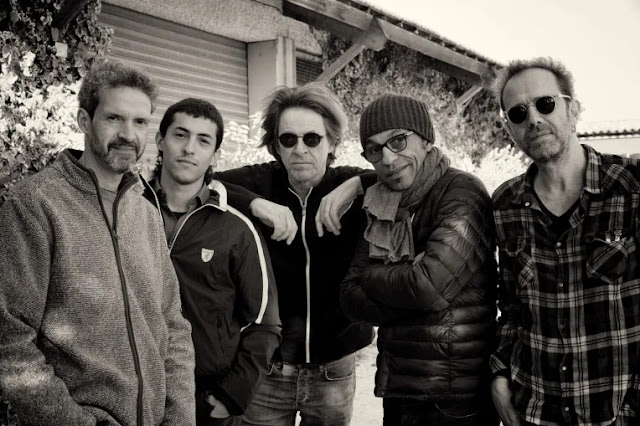 |
| Dominic Miller: Absinthe: ECM |
The guitarist Dominic Miller has been a session musician with such groups as The Pretenders and Phil Collins amongst others. He has been an important collaborator with the singer/bassist/songwriter Sting who he has toured with since 1991. He co-wrote the musician's hit song "Shape of My Heart" which was released in 1993. The talented guitarist also recorded a classical album focused on the music of Bach, Beethoven, and Edward Elgar titled Shapes in 2003.
In 2019, he released an album titled Absinthe on ECM Records. Absinthe is an alcoholic drink made up of wormwood, green anise, sweet fennel, and medicinal herbs. It was famously in fashion among artists and writers in Europe in the late nineteenth and early twentieth century. The drink purportedly had psychoactive and hallucinogenic properties that supposedly were one of the factors that made the creative Impressionistic era so vital The drink was used by notable artists, musicians, and writers including Ernest Hemingway, James Joyce, Erik Satie, Edgar Allan Poe and Pablo Picasso The drink's effects were so malaligned that it was banned in many countries for a period.
Miller's point of reference to Absinthe is his personal acknowledgment of the creative aspects that the drink was supposed to have to have inspired the artists and writers of the Impressionist age, particularly the French Impressionists.
Miller is a sensitive, facile guitarist. He uses his guitar like a paintbrush in the hands of a landscape master, coloring the music with warmth and meaning in a most emotive way. He is found playing both steel and nylon stringed guitars and enlists the talented Bandoneon player Santiago Arias as his perfect foil. The two demonstrate an eery sense of intuition in complimenting each other's musical ideas. Miller's keyboardist Mike Lindup creates atmospheric settings that give the music an otherworldly sound. Nicholas Fiszman provides some anchored bass work and the drum master Manu Katché adds his own touches of percussive magic to the mix.
 |
| Mike Lindup, Santiago Arias, Dominic Miller, Manu Katché, Nicolas Fiszman (Photo credit: Gildas Boclé) |
The music is beautiful and creates a sense of tranquility that acts like a palliative to whatever maybe be pressing on your mind. I've found myself replaying this album several times and each time I play it, I am transported into a state of peace and contentment. Not a small achievement.
There are ten Miller compositions Absinthe, Mixed Blessing, Verveine, La Petite Reine, Christiana, Etudé, Bicycle, Ombu, Tenébres, and Saint Vincent.
The album starts off with the title track "Absinthe," which opens with Miller's nylon string work, Katche's shimmering cymbals, and Arias's swelling bandoneon sound. At the two-minute fifteen-second mark the music morphs into a dynamic, drum-driven vibe that grabs you with a sophisticated funk. Arias's bandoneon pulses with a voice-like expression. Lindup's eerie keyboard work tantalizes the senses like a Siren drawing Odysseus to the rocks. Katche's drum and Fiszman's bass keep the pulse true and the music vibrates to the beat of your sympathetic heartbeat.
There are romantic guitar/bandoneon duets with subtle brushwork by Katché and airy keyboard work by Lindup like on "Mixed Blessings." It's got a Parisian-like feel to it and you find yourself transported, sipping an espresso on the Rue Montogueill with a special someone as you listen to Miller's music.
The short "Verveine" has a melancholic sound to it. Fiszman's bass booms with authority. "La Petite Reine" has a repetitive tom-tom percussion line over which Miller's guitar lays a filigreed line of floating finger-picked strings. "Christiana" is a conversational song that has Arias' moaning bandoneon laying out human-like sighs as Miller's guitar has almost Sitar-like expressiveness and Katché's percussive work is a marvel of intuition.
"Etudé" has a Tango-like quality to it and with Tango, there is always dance. The beat is created by the repetitive lines by Miller, Lindup's ostinato work, Fiszman's bass, and Katché's metronomic trap work. To make my point, the album released a video with dancing on it and you can see for yourself how danceable it is.
"Bicycle" is music in motion. There is a traveling feel to this one. Miller sets it in motion with his facile guitar finger-picking, Arias's swelling bandoneon lines, Katche's roiling drum work, and Fiszman's bass maintain the pulse as Lindup adds the color. Just a delightful aural representation of riding a bike on a pastoral road somewhere in the country.
The album ends with "Ombu" with some impressive syncopated drum work by Katché, the slow sauntering "Tenébres" and the vibrant"Saint Vincent," with Miller's quick-paced rhythmic guitar work setting the stage for Aria's probing bandoneon lines over the rhythm sections driving pulse. Dominic Miller's Absinthe is a delight.
No comments:
Post a Comment